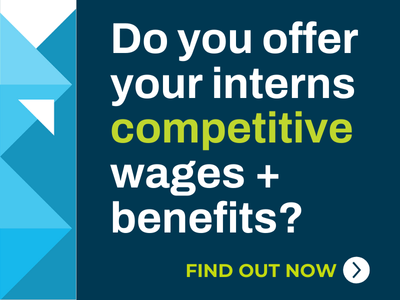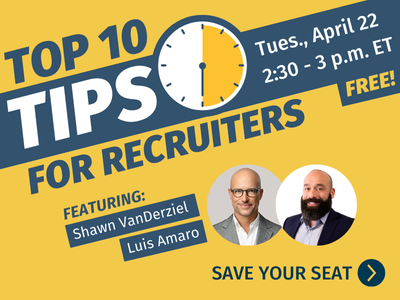Spotlight for Career Services Professionals
Spotlight for Recruiting Professionals
Employers are allowed by law to ask job applicants the following questions related to the applicant’s authorization to work in the United States:
- Are you legally authorized to work in the United States for any employer?
- Will you now or will you in the future require employment visa sponsorship?
International students and career services professionals are often confused about how a student should answer these questions. International students in F-1 status who are eligible for practical training—whether Curricular Practical Training (CPT) or Optional Practical Training (OPT)—will have authorization to work for U.S. employers. However, once the CPT or OPT ends, they will generally require a work visa such as H-1B, which requires employer sponsorship. This causes students and advisers confusion about answering these questions.
How should students answer these questions?
The two questions are asked because they are the only two questions that employers can lawfully ask an applicant about U.S. work authorization without running afoul of citizenship discrimination laws. As a general rule, international students at U.S. universities who qualify for CPT or OPT can answer “yes” to the question of whether they are legally authorized to work for a U.S. employer. Similarly, in almost all cases, students should answer “yes” to the question of whether they now or in the future will require employment visa sponsorship.
The reason is that the vast majority of international grads will require H-1B sponsorship or other work visa sponsorship after the expiration of their CPT or OPT. International students may well disadvantage themselves by hiding the fact that, once their CPT or OPT ends, they will need H-1B sponsorship (or other work visa sponsorship). There are exceptions whereby a student may not need sponsorship, but the exceptions are exceedingly rare.
An employer that hires an international student will invest time and money in that student as an employee. Many employers have policies prohibiting visa sponsorship, and some just do not want the expense or hassle. No one wins if an employer learns after the fact that a student will, in fact, need visa sponsorship at the end of OPT or CPT. It is better to be up front about this issue, even if it means the student loses out on some job or internship opportunities.
There are countless employers in the U.S. that are willing to sponsor work visas (such as H-1B) after OPT or CPT. International students may need to look beyond employers that recruit on campus. Thousands of U.S. employers have no concern about visa sponsorship, particularly smaller to mid-size companies that have trouble recruiting top U.S. students. They are more than willing to entertain visa sponsorship for a top international grad.
What about students with a STEM OPT extension?
Students with STEM degrees, who have the option of the additional 24 months of OPT (beyond the initial 12 months), should still state that “yes” they will require employment visa sponsorship in the future. Even if the student now believes they will return to their home country after using OPT, the student may well change their mind and will, at that point, require visa sponsorship. Some students may justify saying “no” to future employment visa sponsorship, thinking that, after working for the employer using OPT, the employer will be more inclined to sponsor. This may be true, but may also cause an employer to question the employee’s honesty once the employer learns that the student will, in fact, need visa sponsorship. Being direct about the need for visa sponsorship is a prudent course.
Are employers required to inform USCIS if they hire an international student?
When a student works for an employer using CPT or OPT, the student's Student and Exchange Visitor Information System (SEVIS) record will be annotated by the college Foreign Student Adviser, so the government will have a record of where the student works. However, employers have no direct obligation to notify the U.S. Citizenship and Immigration Services (USCIS) that they are hiring or employing an international student. All employers, of course, must complete an I-9 form for all employees. The I-9 form requires all employees to present an identity document (to prove that they are who they say they are) and documents verifying employment authorization in the United States. For employers that are not enrolled in the E-Verify program, the I-9 form is simply kept in a file to access in the event of a government audit of I-9s. For employers enrolled in E-Verify, the information regarding the identity and employment authorization of each employee is transmitted to the federal government for verification. E-Verify is a voluntary program; not all employers are enrolled. Note that if a STEM degree holder wants to get the additional 24 months of OPT, the employer must be enrolled in E-Verify.
What is the new wage-based H-1B lottery system?
The Department of Homeland Security issued regulations that will alter the way the H-1B “lottery” works. As background, the H-1B is the most common work visa in the United States. It is the visa that the vast majority of international grads will need in order to remain in the United States after OPT. There is a limited quota on the number of H-1Bs that can be issued every year. This quota of 85,000 is made available annually on October 1. An employer can “pre-register” to try to get a quota number during a “pre-registration” period. In 2020, the pre-registration period was between March 1 and March 20, 2020 (the 2021 pre-registration period has not yet been announced). During the 2020 pre-registration period, the USCIS received more than 275,000 H-1B pre-registrations for the 85,000 quota. The USCIS performs a random lottery and selects 85,000 cases to process out of the 275,000 pre-registrations filed. (Note: Advanced degree holders have a slight advantage in the lottery.)
Under the new program, the USCIS will prioritize pre-registrations by wage level. The goal is to give H-1B “quota numbers” to the highest wage positions. The Department of Labor maintains a wage database for different occupational categories nationwide. The wages in each occupational category are divided into four wage levels:
- Level 1 wages consistent with entry-level positions (which will be most recent grads);
- Level 2 wages consistent with more experienced workers;
- Level 3 wages consistent with fully independent workers; and
- Level 4 consistent with managerial or very experienced workers.
The new lottery system will prioritize H-1B registrations that are offered wages that meet or exceed the higher wage levels (Level 3 or Level 4). This will likely limit the H-1B opportunities for recent grads, particularly those with a bachelor's degree, and will deter H-1B filing by smaller to mid-size employers. Few employers will want to pay the Level 4 or Level 3 wages to an entry-level recent grad.
It is important to note that many immigration specialists believe that, for a variety of procedural reasons, this new system will not go into effect for the upcoming pre-registration/lottery process (March 1 - 20, 2021). There is also litigation under way challenging the legality of this radical new way of distributing H-1B quota numbers. We will know more in the weeks after the presidential inauguration.
Will small and mid-sized companies be impacted in sponsoring H-1B?
If companies are willing to pay the Level 3 or Level 4 wages to recent grads, then they have a better shot at having their case selected in the H-1B lottery if this new procedure becomes effective. It bears repeating that the new procedure is not yet implemented, and is subject to considerable uncertainty. Employers interested in hiring international graduates should consult with experienced immigration counsel on this issue.
Mark B. Rhoads is an immigration attorney with McCandlish Holton, PC


